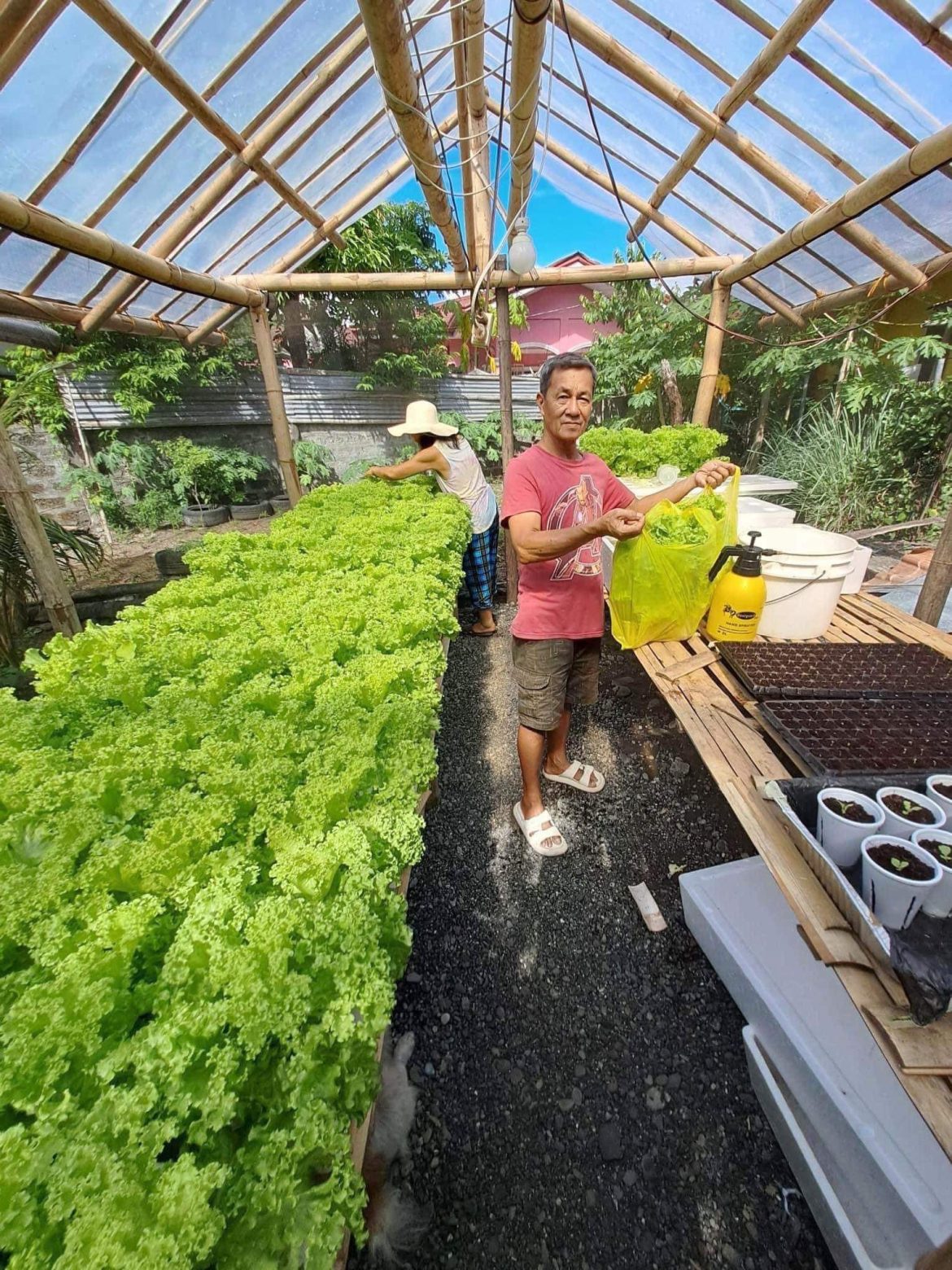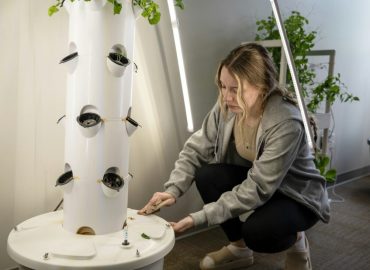Graduate Backyard Hydroponics

Fresh graduate side hustle: Backyard hydroponics is empowering a fresh graduate to earn extra income
Graduate Backyard Hydroponics | James Tababa |
Carl Justin Jubilan is the 24-year-old owner of Jubz Backyard Farm in Miagoa, Iloilo. A fresh graduate in aircraft mechanics, Carl found himself seeking an alternative source of income during the pandemic
Carl conceptualized a business idea while studying in Manila. However, due to the pandemic, he returned to his hometown in Iloilo. In search of a way to sustain his allowance during his time in Metro Manila, he explored different ideas and stumbled upon hydroponics through an internet video. Intrigued, he extensively researched the materials, equipment, and costs involved, and this newfound interest became the foundation for his business.
Carl expresses a keen interest in the features of hydroponics, particularly its user-friendly nature compared to other farming methods that often require hard-to-find materials. He finds the Kratky Hydroponics method appealing as he can easily find the necessary materials in online shops.
“Once the hydroponic system is set up, it requires only minimal maintenance, allowing me to check on it daily until harvest,” Carl said. “The workload is not heavy, making hydroponic farming an efficient and practical option.”
Carl’s chosen hydroponic farming approach involves using tuna boxes with nutrient solution, placing lettuce cups within them. He prefers this over traditional farming methods that rely on soil, opting instead to use cocopeat as the medium for plant growth in his hydroponic system.
The humble beginnings of the hydroponics farm
Recognizing that a hydroponics business was viable due to the accessibility of the required equipment, Carl faced a significant challenge – the lack of sufficient capital. His sole source of money was his allowance, and he hesitated to ask others for funding. His preference was to independently initiate the business, believing that he could handle any potential failure. He felt that assuming financial support from others would bring about a different level of responsibility and pressure if the business were to face setbacks.

Kratky hydroponics housing located in the backyard. (Jubz Backyard Farm)
In October 2022, after Carl’s graduation, he received a generous monetary gift, which he decided to combine with his personal savings to take a risk and venture into business. Utilizing the funds, he purchased the necessary equipment and set up his first greenhouse. Originally planning to start with just one tuna box and a hydroponics starter pack as a trial, Carl stumbled upon an excellent deal on tuna boxes from a seller. Seeking advice, he consulted his sister, who encouraged him to seize the opportunity. Consequently, he chose to begin his venture with eight boxes, capable of growing 120 heads of lettuce.
In November 2022, Carl sowed lettuce seeds and, to his satisfaction, began harvesting just a month later. The trial proved to be a resounding success as he managed to sell all the lettuce. This unexpected triumph led him to contemplate continuing the business. Initially viewed as a mere test run, the business showed promise and potential.
However, a new challenge presented itself as Carl needed to return to Metro Manila to fulfill his school requirements. In response, he decided to pass on the knowledge he gained in hydroponics to his parents. Carl taught them how to plant, what techniques to use, and how to manage the greenhouse.

Lettuce are grown in styrofoam cups with cocopeat growing media in a tuna box with nutrient solution. (Jubz Backyard Farm)
“In the meantime, while I am here in Manila, my parents have been assisting me in managing and maintaining the farm,” Carl said. “Every day, I stay in touch with them through video calls to provide guidance and ensure that the planting and activities in the greenhouse are being monitored.”
During subsequent harvests, the business continued to thrive, consistently selling out its produce. Carl’s advantageous situation was further enhanced by having a brother who worked for an airline, providing him with free flights. Making the most of every long weekend, Carl returned home to manage the business and seek ways to improve its operations.
After another successful harvest, Carl was delighted to find that his produce sold out once again. Having a brother who worked for an airline granted him the perk of enjoying free flights. Seizing this opportunity, he decided to make the most of every long weekend by returning home to actively manage the business and explore ways to enhance its operations.
For his first greenhouse, Carl invested 15,000 pesos, covering essential materials such as bamboo, UV plastics, tuna boxes, styrofoam cups, and nutrient solutions. This initial expenditure proved to be a wise decision, given the promising results and success of the greenhouse in yielding bountiful harvests.
Expanding operations and meeting growing demand
According to Carl, in their initial setup of 120 heads of lettuce, they noticed a significant demand from customers, consistently leading to sold-out produce. To meet the increasing demand, they made the decision to expand their operations by adding eight more boxes, resulting in a total of 240 heads of lettuce grown in a single greenhouse. However, even with this expansion, he still struggled to keep up with the orders, as the demand continued to surpass their supply capacity. To address this challenge, they worked on optimizing their planting schedule to ensure a continuous rotation of harvesting. Despite their efforts, they found themselves unable to fulfill all the orders they were receiving.

Carl offers delivery for bulk and batch orders. (Jubz Backyard Farm)
Fortunately, Carl’s brother recognized the potential of the business and decided to invest in it. With his brother’s financial support, they were able to construct another greenhouse, significantly expanding their production capacity. The new greenhouse accommodated 16 tuna boxes and allowed them to grow 360 heads of lettuce. Combining the production from both greenhouses – the first one with an area of 15 square meters and the second one with 40 square meters – they were now capable of growing a total of 600 heads of lettuce.
Expanding the business
In addition to their hydroponics venture, Carl’s sister also established a ready-to-lay chicken business. Similar to the motivation behind the hydroponics business, the chicken venture was initiated with the intention of creating a long-term income source separate from traditional employment.
During the conceptualization phase of the chicken business, “During the business conceptualization process, we recognized that eggs are a fundamental necessity with a consistent and constant demand,” Carl said.

Aside from lettuce, chickens are also raised in the backyard to provide additional income. (Jubz Backyard Farm)
Carl also noted that lettuce is another highly sought-after product, especially due to the rising popularity of samgyupsal (Korean barbeque). Despite the demand, hydroponics remains relatively unpopular in their community. As a result, the local market primarily relies on distant sources for their lettuce supply.
Capturing the market
In Carl’s barangay, there is a high demand for lettuce among households, neighboring communities, and even the nearby city. To meet this demand, they have strategically marketed their products and established a regular supply schedule to the public market. The response has been overwhelmingly positive, with instances of selling out their lettuce in less than an hour. They have also discovered that consumers prefer medium-sized lettuce over larger ones.
Their pricing strategy involves selling lettuce per head or per cup, with each item priced at 35 pesos or offered at a discounted rate of 3 heads for 100 pesos. Recently, they started promoting their products on Facebook, which has resulted in significant growth for their business. Positive word-of-mouth and shared posts have led to increased recognition and more orders from customers. This online exposure has been particularly fruitful in expanding their customer base.

Aside from lettuce, chickens are also raised in the backyard to provide additional income. (Jubz Backyard Farm)
Carl is proactive in seeking new opportunities for business growth. He approaches shops and restaurants, offering their lettuce, to explore potential partnerships and markets.
“I believe our products are always in high demand because there seems to be a shortage in the supply of lettuce,” Carl said. “Through observation, I’ve noticed that lettuce available in the market is often wilted or not as fresh as the lettuce grown in our hydroponic system. Moreover, some marketplaces price their lettuce higher than ours.”
Challenges
The initial challenge Carl and his team faced was securing the necessary financial investment to start their hydroponics farm. Acquiring funds for procuring materials proved to be difficult at the outset. Despite the daunting start, Carl remains optimistic that the effort invested will eventually yield rewarding results. However, finding a suitable location for growing lettuce presented another obstacle due to the tall trees surrounding their backyard. The trees cast shadows and block sunlight at specific times, which affected the growth of the lettuce. Lettuce requires ample sunlight to thrive, making the shade an ongoing concern.
Another ongoing challenge they face is with delivery logistics, as the cost of gasoline can sometimes outweigh the profits from their products. As a solution, they considered delivering by batch, accumulating a larger number of orders before making deliveries, in order to optimize their resources and expenses.
Prior to venturing into this business, Carl had no prior experience in farming. He relied on educational resources like YouTube videos and hydroponics farm pages, where beginners often ask questions and share tips.
The demanding effort required at the outset made Carl contemplate whether the endeavor was truly worth it. The income generated during the startup phase was not substantial, adding to the challenge.
However, “I firmly believe that the returns are highly rewarding, as I have observed a consistent market demand for lettuce,” Carl said. “This encouraging trend motivates me to continue supplying lettuce as long as there are buyers interested in our products.”
Future goals and aspirations
Carl’s family serves as his main inspiration, providing unwavering support that motivates him to persevere in his business venture. He expresses deep gratitude to his parents, “Without their assistance, I wouldn’t be able to continue our lettuce production due to my recent busy training schedule,” he said. “Thanks to their support, I can sustain the lettuce production effectively.”

The greenhouse of the farm is made of bamboo poles, plastic nets, and UV plastic roofing. (Jubz Backyard Farm)
For further improvement, Carl plans to expand the business by constructing additional greenhouses using the Nutrient Film Technique (NFT) method. This technique will enable him to grow more lettuce per square meter, enhancing their productivity. He is also determined to find ways to reduce the cost of the nutrient solution, which currently incurs high expenses when ordered from Manila to the province. Exploring cost-effective alternatives will contribute to maximizing their profits.
Carl also aims to diversify their lettuce varieties, introducing new options that appeal to consumers. Currently, they grow only one type of variety, but by offering different lettuce options, they can cater to varying preferences and potentially expand their customer base.
Carl is committed to reducing waste materials, particularly the styro cups used for packaging. He plans to implement a cup-return or buy-back system to encourage consumers to return the cups after purchase.
“Our main goal is to achieve a low-cost but high-quality product for our consumers,” he said.
Advice for aspiring hydroponics entrepreneurs
Carl’s advice for individuals with no prior knowledge looking to enter the hydroponics business, “Don’t be afraid to take risks and always be willing to experiment with ideas that can enhance the business,” he said.
He urges aspiring entrepreneurs to seek knowledge online through research, reading, and practical application. Carl shares that when he began his hydroponics journey, he engaged in reading, sought tips, and actively worked on improving his methods.

Newly sprouted lettuce seedlings. (Jubz Backyard Farm)
For those interested in starting a hydroponics business, Carl suggests beginning on a small-scale using starter packs. This allows them to familiarize themselves with the system’s workings. Carl highlights that hydroponics can be initiated in backyards or even on rooftops. As confidence and understanding grow, they can gradually expand and tailor the system to suit their capabilities.
“Hydroponics farming is both challenging and fulfilling. Running hydroponics farm can be compared to taking care of a child, where you must meet its needs and provide proper care to ensure its growth and success,” he said. The analogy points out the need for attentiveness and provision of care to ensure the hydroponics venture thrives and prospers.
Original Article: https://mb.com.ph/2023/7/25/fresh-graduate-side-hustle-backyard-hydroponics-is-empowering-a-fresh-graduate-to-earn-extra-income
The post Graduate Backyard Hydroponics appeared first on GROZINE.


